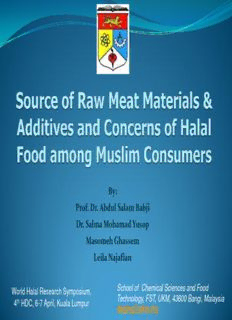
Source of Raw Meat Materials & Additives and Concerns of Halal Food among Muslim Consumers PDF
Preview Source of Raw Meat Materials & Additives and Concerns of Halal Food among Muslim Consumers
By: Prof. Dr. Abdul Salam Babji Dr. Salma Mohamad Yusop Masomeh Ghassem Leila Najafian School of Chemical Sciences and Food World Halal Research Symposium, Technology, FST, UKM, 43600 Bangi, Malaysia 4th HDC, 6-7 April, Kuala Lumpur [email protected] INTRODUCTION The food industry, like any other industry, responds to the needs and desires of the consumer. People all over the world are now more conscious about foods, health, and nutrition. Many people are interested in foods that are organically produced without the use of synthetic pesticides and other non-natural chemicals. Muslims follow the Islamic dietary code, and foods that meet that code are called halal (lawful or permitted). Muslims are supposed to make an effort to obtain halal food of good quality. It is their religious obligation to consume only halal food. The global market for halal products is estimated at USD 580 billion a year and global halal trade is approximately USD 80 billion or 5% of total trade of agri-food products. Rising income levels in key Muslim markets have led to higher consumption rates and therefore more opportunities for halal food producers. ESTIMATED GLOBAL HALAL MARKET VALUE Animal proteins, fats and by-products added to meat-based products economic, sensory, texture and flavor reasons. Animal proteins, hydrolysates, fats and skin readily available increased demand (Babji, et.al, 1999). Today‟s consumers (Muslims) -- concern on HALAL, health, diet and wholesomeness products. Development of HALAL , healthful new meat based- products a profitable venture Health conscious consumer-driven market especially in selecting meat products (high fat, high cholesterol, unhealthy) Manufacturers have to consider quality, consumer preference, overall acceptance, cost and pricing as equally important factors in the formulation of fish, poultry and meat products. HALAL FOODS QURAN VERSE ON HALAL FOOD “O ye people! Eat of what is on earth, lawful and good; and do not follow the footsteps of the Evil One, for he is to you an avowed enemy.” (Al- Baqarah:168) “O you who believe (in the Oneness of Allah)! Eat of the good things that We have provided you, and be grateful to Allah if it is (indeed) He Whom you worship”. (Al-Baqarah:172) “Eat of that which Allah hath provided for you lawful and good; but fear Allah, in Whom ye believe.” (Al Maidah:88) Halal is a term designating any object or an action which is permissible to use or engage in, according to Islamic law. It is the opposite of Haram. Haram means prohibited. The commandments of the Qur`an, the Holy Book, and religious ethics permit Muslims to consume only halal food.
Description: